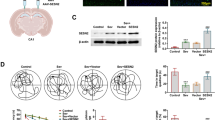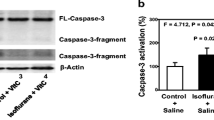Abstract
Although the underlying mechanisms of isoflurane-induced cognitive impairments remain largely to be determined, neuronal inflammation and apoptosis are thought to be major contributors. Resveratrol is a naturally available herbal compound for the treatment of inflammatory and neurodegenerative diseases. We therefore aimed to investigate the effects of resveratrol on the isoflurane-induced cognitive impairments and the associated hippocampal inflammation responses and neuronal apoptosis in the aged mice. Fifteen-month-old male C57BL/6 mice received 2 h of 1.5 % isoflurane or oxygen exposure 24 h after the intraperitoneal injection of resveratrol or saline daily for 7 consecutive days. Here, we showed that the isoflurane anesthesia decreased the freezing time to context significantly at 48 h after the isoflurane exposure in the fear conditioning test. The hippocampal levels of IL-1β, TNF-α, NLRP3, cleaved caspase-3, and Bax increased significantly while the hippocampal levels of IkBα and Bcl-2 decreased significantly at 6 and/or 48 h after the isoflurane anesthesia. All these effects induced by isoflurane were attenuated by resveratrol pretreatment. However, the isoflurane anesthesia had no significant effect on the hippocampal Sirt1. In conclusion, our results suggest that resveratrol attenuates the hippocampus-dependent cognitive impairment induced by isoflurane anesthesia through its anti-inflammation and anti-apoptosis effects in aged mice.





Similar content being viewed by others
References
Anekonda TS (2006) Resveratrol—a boon for treating Alzheimer’s disease? Brain Res Rev 52:316–326
Bai T, Dong DS, Pei L (2013) Resveratrol mitigates isoflurane-induced neuroapoptosis by inhibiting the activation of the Akt-regulated mitochondrial apoptotic signaling pathway. Int J Mol Med 32:819–826
Bianchi SL et al (2008) Brain and behavior changes in 12-month-old Tg2576 and nontransgenic mice exposed to anesthetics. Neurobiol Aging 29:1002–10010
Bondeson J, Foxwell B, Brennan F, Feldmann M (1999) Defining therapeutic targets by using adenovirus: blocking NF-kappaB inhibits both inflammatory and destructive mechanisms in rheumatoid synovium but spares anti-inflammatory mediators. Proc Natl Acad Sci U S A 96:5668–5673
Busch F, Mobasheri A, Shayan P, Lueders C, Stahlmann R, Shakibaei M (2012) Resveratrol modulates interleukin-1β-induced phosphatidylinositol 3-kinase and nuclear factor κB signaling pathways in human tenocytes. J Biol Chem 287:38050–38063
Cao L, Li L, Lin D, Zuo Z (2012) Isoflurane induces learning impairment that is mediated by interleukin 1β in rodents. PLoS One 7:e51431
Cibelli M et al (2010) Role of interleukin-1beta in postoperative cognitive dysfunction. Ann Neurol 68:360–368
Culley DJ, Baxter MG, Crosby CA, Yukhananov R, Crosby G (2004a) Impaired acquisition of spatial memory 2 weeks after isoflurane and isoflurane-nitrous oxide anesthesia in aged rats. Anesth Analg 99:1393–1397
Culley DJ, Baxter MG, Yukhananov R, Crosby G (2004b) Long-term impairment of acquisition of a spatial memory task following isoflurane-nitrous oxide anesthesia in rats. Anesthesiology 100:309–314
Dash PK, Orsi SA, Moore AN (2005) Sequestration of serum response factor in the hippocampus impairs long-term spatial memory. J Neurochem 93:269–278
Feng X et al (2013) Resveratrol inhibits β-amyloid-induced neuronal apoptosis through regulation of SIRT1-ROCK1 signaling pathway. PLoS One 8:e59888
Fidalgo AR et al (2011) Peripheral orthopaedic surgery down-regulates hippocampal brain-derived neurotrophic factor and impairs remote memory in mouse. Neuroscience 190:194–199
Foti Cuzzola V, Ciurleo R, Giacoppo S, Marino S, Bramanti P (2011) Role of resveratrol and its analogues in the treatment of neurodegenerative diseases: focus on recent discoveries. CNS Neurol Disord Drug Targets 10:849–862
Hovens IB, Schoemaker RG, van der Zee EA, Heineman E, Izaks GJ, van Leeuwen BL (2012) Thinking through postoperative cognitive dysfunction: how to bridge the gap between clinical and pre-clinical perspectives. Brain Behav Immun 26:1169–1179
Kim MY et al (2013) Resveratrol prevents renal lipotoxicity and inhibit mesangial cell glucotoxicity in a manner dependen on the AMPK-SIRT1-PGC1α axis in db/db mice. Diabetologia 56:204–217
Kong F et al (2013) Minocycline attenuates cognitive impairment induced by isoflurane anesthesia in aged rats. PLoS One 8:e61385
Li H, Yin J, Li L, Deng J, Feng C, Zuo Z (2013) Isoflurane postconditioning reduces ischemia-induced nuclear factor-κB activation and interleukin 1β production to provide neuroprotection in rats and mice. Neurobiol Dis 54:216–224
Lin D, Zuo Z (2011) Isoflurane induces hippocampal cell injury and cognitive impairments in adult rats. Neuropharmacology 61:1354–1359
Loop T et al (2005) Volatile anesthetics induce caspase-dependent, mitochondria-mediated apoptosis in human T lymphocytes in vitro. Anesthesiology 102:1147–1157
Martinon F, Pétrilli V, Mayor A, Tardivel A, Tschopp J (2006) Gout-associated uric acid crystals activate the NALP3 inflammasome. Nature 440:237–241
Moller JT et al (1998) Long-term postoperative cognitive dysfunction in the elderly ISPOCD1 study. ISPOCD investigators. International Study of Post-Operative Cognitive Dysfunction. Lancet 351:857–861
O’Riordan KJ et al (2006) Regulation of nuclear factor κB in the hippocampus by group I metabotropic glutamate receptors. J Neurosci 26:4870–8479
Prabhakar O (2013) Cerebroprotective effect of resveratrol through antioxidant and anti-inflammatory effects in diabetic rats. Naunyn Schmiedebergs Arch Pharmacol 386:705–710
Ramadori G et al (2008) Brain SIRT1: anatomical distribution and regulation by energy availability. J Neurosci 28:9989–9996
Ramaiah R, Lam AM (2009) Postoperative cognitive dysfunction in the elderly. Anesthesiol Clin 27:485–496
Rammes G et al (2009) Isoflurane anaesthesia reversibly improves cognitive function and long-term potentiation (LTP) via an up-regulation in NMDA receptor 2B subunit expression. Neuropharmacology 56:626–636
Raval AP, Dave KR, Pérez-Pinzón MA (2006) Resveratrol mimics ischemic preconditioning in the brain. J Cereb Blood Flow Metab 26:1141–1147
Renault TT, Teijido O, Antonsson B, Dejean LM, Manon S (2013) Regulation of Bax mitochondrial localization by Bcl-2 and Bcl-x (L): keep your friends close but your enemies closer. Int J Biochem Cell Biol 45:64–67
Saab BJ et al (2010) Short-term memory impairment after isoflurane in mice is prevented by the α5 γ-aminobutyric acid type A receptor inverse agonist L-655, 708. Anesthesiology 113:1061–1071
Schroder K, Zhou R, Tschopp J (2010) The NLRP3 inflammasome: a sensor for metabolic danger? Science 327:296–300
Shaftel SS, Griffin WS, O’Banion MK (2008) The role of interleukin-1 in neuroinflammation and Alzheimer disease: an evolving perspective. J Neuroinflammation 5:28
Shakibaei M, Buhrmann C, Mobasheri A (2011) Resveratrol-mediated SIRT-1 interactions with p300 modulate receptor activator of NF-kappaB ligand (RANKL) activation of NF-kappaB signaling and inhibit osteoclastogenesis in bone-derived cells. J Biol Chem 286:11492–11505
Shen M et al (2012) Resveratrol attenuates ischemia/reperfusion injury in neonatal cardiomyocytes and its underlying mechanism. PLoS One 7:e51223
Steinmetz J, Christensen KB, Lund T, Lohse N, Rasmussen LS (2009) Long-term consequences of postoperative cognitive dysfunction. Anesthesiology 110:548–555
Terrando N, Monaco C, Ma D, Foxwell BM, Feldmann M, Maze M (2010) Tumor necrosis factor-alpha triggers a cytokine cascade yielding postoperative cognitive decline. Proc Natl Acad Sci U S A 107:20518–20522
Tiwari V, Chopra K (2013) Resveratrol abrogates alcohol-induced cognitive deficits by attenuating oxidative-nitrosative stress and inflammatory cascade in the adult rat brain. Neurochem Int 62:861–869
Vizcaychipi MP, Lloyd DG, Wan Y, Palazzo MG, Maze M, Ma D (2011) Xenon pretreatment may prevent early memory decline after isoflurane anesthesia and surgery in mice. PLoS One 6:e26394
Wei H, Xie Z (2009) Anesthesia, calcium homeostasis and Alzheimer’s disease. Curr Alzheimer Res 6:30–35
Wu X et al (2012) The inhalation anesthetic isoflurane increases levels of proinflammatory TNF-alpha, IL-6, and IL-1beta. Neurobiol Aging 33:1364–1378
Xie Z et al (2006) The common inhalation anesthetic isoflurane induces apoptosis and increases amyloid beta protein levels. Anesthesiology 104:988–994
Yan XB, Ouyang W, Li G, Duan KM (2012) Involvement of neuronal nitric oxide synthase in cognitive impairment in isoflurane-treated rats. Neurosci Lett 506:240–244
Yeh SH, Lin CH, Lee CF, Gean PW (2002) A requirement of nuclear factor-κB activation in fear-potentiated startle. J Biol Chem 277:46720–46729
Zhang Y et al (2012) Anesthetics isoflurane and desflurane differently affect mitochondrial function, learning, and memory. Ann Neurol 71:687–698
Zhang L, Zhang J, Yang L, Dong Y, Zhang Y, Xie Z (2013) Isoflurane and sevoflurane increase interleukin-6 levels through the nuclear factor-kappa B pathway in neuroglioma cells. Br J Anaesth 110:i82–i91
Zhong LM et al (2012) Resveratrol inhibits inflammatory responses via the mammalian target of rapamycin signaling pathway in cultured LPS-stimulated microglial cells. PLoS One 7:e32195
Acknowledgments
This work was supported by National Natural Science Foundation of China (81271216, 81222013) and Natural Science Foundation of Jiangsu Province (BK2012778).
Author information
Authors and Affiliations
Corresponding author
Additional information
Xiao-min Li and Mai-tao Zhou contributed equally to this work.
Rights and permissions
About this article
Cite this article
Li, Xm., Zhou, Mt., Wang, Xm. et al. Resveratrol Pretreatment Attenuates the Isoflurane-Induced Cognitive Impairment Through its Anti-Inflammation and -Apoptosis Actions in Aged Mice. J Mol Neurosci 52, 286–293 (2014). https://doi.org/10.1007/s12031-013-0141-2
Received:
Accepted:
Published:
Issue Date:
DOI: https://doi.org/10.1007/s12031-013-0141-2




